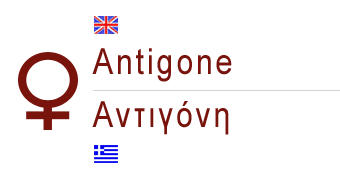Antigone or Antigoni is a common female name, whose origins are found in Ancient Greece. There are two theories about the meaning of the name; according to the first it means the unbending, as it comes from the word anti-, which means opposite to, and –gon, which means the corner and the bend. According to the second theory, which is the most popular name Antigone means “instead of mother”, as “gone” in ancient Greek means the one who generates, who gives birth.
 Sound of Name Antigone: A-nti-go’-nee
Sound of Name Antigone: A-nti-go’-nee
Nameday of Antigone: September 1st
Male Version of name Antigone: Antigonos (not common in modern Greek)
Origin of name Antigone
Antigone is a famous name due to one of the most known stories of ancient Greece. Antigone was one of the two daughters of king Oedipus of Thebes, famous for her decision to disobey the king of Thebes Kreon, who buried her alive because she decided to give a proper burial to her brother Polynikis who had attacked their city. The story of Antigone became a drama, a tragedy written by Sophocles, and has inspired numerous artists throughout the centuries.
The Greek Orthodox Church doesn’t recognize this Antigone though. According to the Church, Antigone was one of the 40 Maidens that were killed by Likinius, ruler of Orace who killed them to punish Ammon a teacher from Adrianoupolis who was a Christian and did not adopt the Paganism.
Nicknames deriving from name Antigone
Antigone, as most ancient Greek names, doesn’t have many diminutives and nicknames. The ones used today are Antigonoula, Anta and Gone.
The Names’ Fairy reveals the meaning of the name Antigone
Antigone is a very dependable and reliable person. She takes full responsibility of her actions and she is very loyal to family and friends. She is usually following the rules, even if they suppress her feelings and beliefs.

Another nickname is “Tiggy.”
actually, Antigone or (Greek) ΑΝΤΙΓΟΝΗ means “against birth”: from Greek, “ΑΝΤΙ”, which means “against”, and “ΓΟΝΗ” which means “birth”
1. According to the Greek legend, Antigone was the daughter of Oedipus and Jocasta.
2. Also, from History, the first spouse of Alexander the Great was a young molossian woman whose name was Antigone. Alexander the Great built a small town in Northern Epirus and called it Antigone in honor of his first wife.